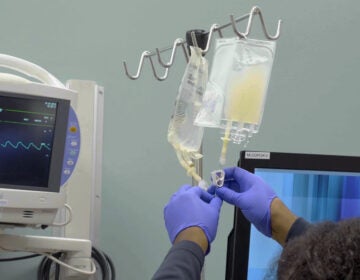Penn Medicine partners with Mark Cuban’s pharmacy company to source generic medications for retail locations
Mark Cuban’s Cost Plus Drugs marketplace company is designed to help hospitals and health systems source generic drugs from manufacturers.
Listen 1:08
Billionaire investor and businessman Mark Cuban recently met with leaders at Penn Medicine, including University of Pennsylvania Health System CEO Kevin Mahoney (left) and Penn Medicine vice president and chief pharmacy officer Nishaminy Kasbeker (center). (Courtesy of Penn Medicine)
From Philly and the Pa. suburbs to South Jersey and Delaware, what would you like WHYY News to cover? Let us know!
Penn Medicine is partnering with billionaire investor Mark Cuban to streamline the availability of generic prescription drugs for its network of pharmacy locations.
The nonprofit health system’s new partnership with the Mark Cuban Cost Plus Drug Co. marketplace for businesses officially goes into effect in January.
The marketplace is part of Cuban’s larger mission to reduce drug shortages and help bring down rising health care costs for patients, hospitals and health systems by cutting out industry “middlemen” and limiting drug pricing markups.
In the new partnership with Penn Medicine, Cuban’s company will source generic drugs from pharmaceutical manufacturing companies at lower costs and with fewer hurdles, officials said.
Penn Medicine’s Chief Pharmacy Officer Nishaminy Kasbekar said this was an appealing option for a large health system that fills about 1.5 million prescriptions each year.
“Supply chain costs have gone up, drug costs have gone up, there’s a rising increase in the complexity of medications,” Kasbekar said. “I think health systems are really looking at ways and opportunities to do things differently and to kind of relieve some of those cost pressures.”
Kasbekar said Penn Medicine plans to take whatever savings it makes from the new partnership and reinvest that money in health care programs and services that support patients.
“This joint effort goes beyond cost savings — it’s about empowering health care providers like Penn Medicine to deliver superior care by removing financial barriers to essential medications,” Cuban said in a statement.
Penn Medicine is among the first large health care systems in the country to sign on to Cuban’s marketplace program, and Kasbekar predicts more will follow.
“This is just an early step to try and figure out how to make change in a dynamic and rapidly evolving field,” she said. “As things come down the pike like AI and other kinds of initiatives, I think we need to be more nimble and adaptable to some of these new innovators.”
Cuban’s company, co-founded with Dr. Alex Oshmyansky, will help Penn Medicine fill prescriptions for the top 100 commonly dispensed generic drugs for conditions like cancer, diabetes, asthma and others.
Patients will see limited changes and will not need to do anything different in order to get their medications, health leaders said.
The businesses marketplace service is separate from Cuban’s Cost Plus Drugs direct-to-consumer online pharmacy program, which sells generic medications at lower prices directly to individual patients and bypasses their health insurance.
This can be a viable option for people whose prescription drugs actually cost more through their health insurance plans after medications get marked up by industry “middlemen” like pharmacy benefit managers.
Kasbekar said Penn Medicine will still continue to buy and source generic drugs from other distributor companies with plans to eventually transition all of its generic medication prescription supply to the Cost Plus Drugs marketplace.
The health system will still use other distributors and companies to stock brand name medications and biological drugs like insulin, gene therapies, monoclonal antibodies and others that don’t have generic equivalents.
____
Editor’s note: Penn Medicine is a WHYY supporter. WHYY News produces independent, fact-based news content for audiences in Greater Philadelphia, Delaware and South Jersey

Get daily updates from WHYY News!
WHYY is your source for fact-based, in-depth journalism and information. As a nonprofit organization, we rely on financial support from readers like you. Please give today.





